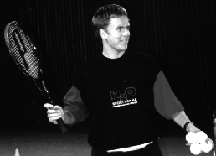|
Juniors Lessons

The Right Approach to Tennis Drills, Part Three
 by Stefan
Lundgren, TennisONE International Contributing Editor by Stefan
Lundgren, TennisONE International Contributing Editor
Preface
I have spent the last two years working full time on a
computer program, Computer Tennis - Practice Drills, which contains a number
of practice drills (http://www.buller.se/usr/stefan.lundgren/ell-hs.htm).
This work has lead to many questions and many rewarding discussions with
knowledgeable tennis persons all over the world. During these two years
I have also given a number of lectures on the subject practice drills, and
these discussions and lectures are the basis of this series of articles.
Contents

Part Three: Planning Lessons for Kids
Why should the lessons be planned? You have thought about the
practice before the start of the session and have come up with things that
the players need to work on the most. You have time to teach the things
that you have planned for the lesson. You never get into situations where
you do not know what to do. The players know what they are doing and why
they are doing it. You get respect from both players and others in the vicinity
when they see that you conduct your practice in a professional way.
Planning of lessons for kids' and minitennis practice
- 45 minutes, mainly with foam-rubber balls
- Gathering
- Warm-up
- Game or a fun drill
- Mixing technique, games, tennis-related games and breaks
- Game or a fun drill
This planning of a lesson is not a solution on how a practice session
should be conducted, but these parts should to be included in a lesson,
and they should to be performed in this order. However, it is important
to remember to vary the practice, so that the players do not find the practice
boring and predictable.
- 45 minutes, mainly with foam-rubber balls: Kids and minitennis
players often cannot concentrate for more than 45 minutes. If you go through
a 60 minute lesson, the last 15 minutes often do not work well. The players
generally leave the practice tired and with the image that the session
was difficult and boring. It is imperative that the players leave the practice
happy and positive and already looking forward to the next lesson.
- Gathering: Spend a few minutes in the beginning of the session
to chat with the players, about what they have been doing since the last
time you practiced, what they would like to work on today, etc. It's important
that the players feel welcome and that they feel that you care about them,
with regards to the tennis and other things.
- Warm-up: You cannot demand or assume that a kid or minitennis
player can go through the warm-up on his/her own. Thus, it is best if you
go through a joint warm-up session together with the players. After a few
months of a joint warm-up, you can put more and more of the responsibility
on the players, and eventually, they can go through it themselves before
the start of the practice.
- Game or a fun drill: This is the first thing you do when the
practice session has started. A game or a fun drill means that the players
will be in a good mood, and you lay a good foundation for a successful
session.
- Mixing technique, games, tennis-related games and breaks: The
most important thing to remember is that the younger the players, the more
games you need to include in the practice. You must remember that kids
and minitennis players almost always play for the fun of it, not necessarily
to improve the game. If you can get the players to play on a regular basis,
they will also improve quickly. A fun practice also improves the chances
that the players will play more regularly.
It is important to try to use games that are as tennis-related as possible.
Tennis-related games are those where you use a ball or a racket in some
way. The tennis-related games will improve the pupil's feel for the ball
and racket in a way that pure games can not. At the same time, these games
can be made as fun as pure games. Of course technique is important, but
try to make it as much fun as possible. An important shot which is often
forgotten when practicing with kids and minitennis players is the serve.
Try to practice the serve every time you practice, no matter which player
category you are working with. It does not have to be pure technique. There
are serve drills that kids and minitennis players find very entertaining.
- Game or a fun drill: It's important that the players leave the
practice session with a positive image, and they will if the session is
ended with a game or a fun drill.
|
|

